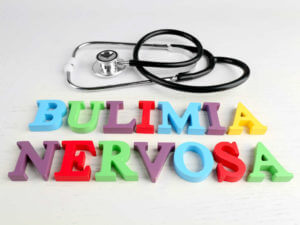What is Bulimia?
Bulimia Nervosa or known as “bulimia” is an eating disorder that can have negative health consequences or be life-threatening. Someone with bulimia will consume larger than normal amounts of food in a short period of time and then compensate for it by using unhealthy measures such as purging, diet aids, diuretics, laxatives, enemas or excessive exercise to get rid of the calories that were consumed.
Symptoms
If you suffer from bulimia you are probably thinking about your weight and shape frequently to the point that it affects your life. You may judge yourself in a harsh way, think negatively about yourself and it is extremely hard to overcome.
- Severe fear of gaining weight
- Obsessed with body weight and shape
- Loss of control with eating, binging or what you are eating
- Using extreme measures such as vomiting or exercise to control your weight
- Using diuretics, laxatives, enemas or other weight-loss strategies to stay thin
- Using supplements or other medications to lose weight
- Mood swings or depression
- Sore throat from vomiting
- Heartburn, indigestion or bloating
- Irregular periods
- Risking calories or fasting between binging sessions
How severe the case of bulimia is, depends on how often purging is happening; a severe case is usually once a week for up to 3 months.
Bulimia
Today we are going to discuss another serious eating disorder: Bulimia Nervosa.
Eating disorder terms get thrown around a lot, whether socially or in the media and the gravity of how dangerous they are can get lost. I’m here to talk about what bulimia is and what it isn’t.
The first part of bulimia is the binge. This is eating a large quantity of food in a short period of time. Now this could look different from person to person so what really matters to me is how each person defines their own binge. A lot of people struggling with bulimia say it’s almost an out-of-body experience. It’s like turning on a light switch. Maybe not realizing you’re binging until it’s over and the wrappers and receipts are there to show you what has happened. During the binge the person feels completely out of control and afterwards left with that gut wrenching thought of “Oh my god what have I done?”. Up until this point it’s pretty similar to what we have discussed in the binge eating disorder video but this is where it changes.
The second part of bulimia following the binge and the out-of-control behavior is something to make up for the bench to compensate from what has happened. This can also look different from person to person as well. Self induced vomiting laxatives, diuretic stimulants such as crystal meth or cocaine are a few ways people purge the calories that were consumed during a binge. Other behaviors can include excessive exercise, starving, cleansing, and fasting. In this world it gets really confusing where extreme dieting fasting and excessive exercise is not only the norm, but it’s encouraged. Someone struggling with bulimia is highly focused on their body shape and weight which often drives those eating disorder behaviors. This doesn’t mean that everyone on a diet or working out a lot has bulimia. Sometimes people use eating disorder statements loosely. For instance a friend going to the bathroom after eating; “Oh she must have bulimia”
No that’s not entirely true at all. That’s an unqualified and uneducated guess if you will. It’s important to seek help if you’re experiencing any of these binge purge behaviors. Address the disorder head on and find peace with food and your body.
Health Consequences
- Stomach ulcers
- Dental problems such as cavities or tooth sensitivity
- Dehydration
- Heart attack
- Lower libido
- Irregular heartbeat
- Ruptures of stomach or esophagus
- Higher chance of suicidal behavior
Causes
There is no known cause for bulimia nervosa that people have found right now. Many people believe that an eating disorder begins with a severe dissatisfaction with one’s body and obsession with their body and shape size.
People with this disorder usually have low self-esteem and have an intense fear of gaining weight. Bulimia also runs in the family which also shows that there is a genetic component to it and that it is inherited.
Genetics
Some people may have genetic components that make them more likely to develop an eating disorder than others. Brain chemicals or other biological factors may play a role in eating disorders.
Psychological
People with this disorder are more likely to suffer from other mental health disorders such as perfectionism, low self-esteem, impulsive behavior and difficulty maintaining relationships.
Risk Factors
Young women and teenage women are the most likely to develop an eating disorder compared to young or older men. Despite this, men can still have eating disorders. They can develop at any age but the most common is during their early teens or 20’s. There are many risk factors that can contribute to your odds of developing an eating disorder. Whether it be your environment, stress level or mental health, these things can make it more likely for you to suffer from an eating disorder. Below are some of the most common risk factors:
Family History
It is significantly more likely for someone to develop an eating disorder if they have a sibling or parent that has an eating disorder.
Mental Health
People with eating disorders usually have a history of other mental health disorders such as anxiety, depression, or obsessive-compulsive disorder.
Stress
Different stressors in a person’s life such as moving, going to college, getting a new job, problems in relationships or other life changes can cause someone to develop an eating disorder.
Dieting
Excessive dieting can lead to an eating disorder depending on the severity of it. Extreme cases of dieting or starvation can cause changes in the brain that affect our mood, anxiety, loss of appetite or rigidity in thinking. There is lots of evidence to suggest that an eating disorder mimics the same behaviors as starvation. Weight loss or starvation can cause harm to the brain and change the way that it functions and cause eating disorders or unhealthy eating habits. This can make it a challenge to return to a normal lifestyle with healthy eating habits.
Prevention
In order to prevent eating disorders from happening, there are prevention programs that are designed to reduce the onset of eating disorders with systems and training that can help the population become more educated. “The Mental Health Intervention Spectrum, developed by the National Academy of Sciences (Committee on the Prevention of Mental Disorders, 2009), classifies different types of prevention programs according to their goals, methods, and audiences”
Primary Prevention
This type of prevention aims to target a certain population (adolescents in California or students at a certain college) and is designed to change public policy, cultural attitudes and practices and how institutions are run. The goal of this is to prevent eating disorders from happening or reduce the risk of them happening in the area. This type of prevention involves education, public policy, and other social actions.
Targeted Prevention
Targets a specific population that may be at risk due to the warning symptoms for developing an eating disorder or clear risk factors such as severe body dissatisfaction. The person has not yet developed an eating disorder but has warning signs that they could develop one and prevention will help to stop that from happening. This type of prevention aims to stop the disorder from affecting an individual rather than a group of people or community.
Selective Prevention
The goal is to target a group of people who have not yet displayed symptoms of an eating disorder but hold some of the other risk factors such as biological, psychological or socio-cultural factors (parent or sibling with an eating disorder, adolescent teenaged 10-13 hitting puberty, pressure to remain thin, etc.).
Self-Care
It’s important to practice self-care as much as possible, even when receiving treatment in Los Angeles because this can be the best thing for the individual. Self-care can include doing anything that better improves an individual’s recovery and wellbeing. Consider the following:
- Practicing how to say “no” when something does not fit in with one’s recovery
- Getting comfortable with imperfections
- Writing in a journal
- Being compassionate to oneself and one’s needs
- Accepting the path of recovery rather than fighting it
Start Your Recovery Today in Los Angeles
Bulimia is a serious condition that can be fatal if not appropriately treated. If you or someone you love is struggling with bulimia, do not waste one more minute. You can recover from this disorder by attending Breathe Life Healing Center’s eating disorder treatment in Los Angeles.
Call right now.














